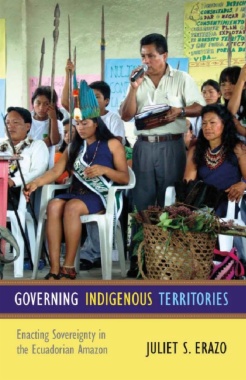Governing Indigenous Territories illuminates a paradox of modern indigenous lives. In recent decades, native peoples from Alaska to Cameroon have sought and gained legal title to significant areas of land, not as individuals or families but as large, collective organizations. Obtaining these collective titles represents an enormous accomplishment; it also creates dramatic changes. Once an indigenous territory is legally established, other governments and organizations expect it to act as a unified political entity, making decisions on behalf of its population and managing those living within its borders. A territorial government must mediate between outsiders and a not-always-united population within a context of constantly shifting global development priorities. The people of Rukullakta, a large indigenous territory in Ecuador, have struggled to enact sovereignty since the late 1960s. Drawing broadly applicable lessons from their experiences of self-rule, Juliet S. Erazo shows how collective titling produces new expectations, obligations, and subjectivities within indigenous territories.
- Contents
- List of Maps
- Selected Acronyms
- Acknowledgments
- Preface
- Introduction
- One: History, Empowerment, and Rule
- Two: Collectivist Utopias and “The Graveyard of Development Projects”
- Three: The Property Debate
- Four: Conservation and Environmental Subjects
- Five: Everyday Forms of Territory Formation
- Conclusion: Making Citizens, Making Leaders, Making Territories
- Appendixes
- Notes
- References
- Index

